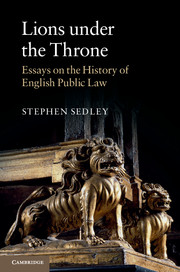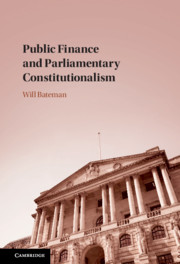Lions under the Throne
Essays on the History of English Public Law
£34.99
- Author: Stephen Sedley, University of Oxford
- Date Published: September 2015
- availability: Available
- format: Paperback
- isbn: 9781107559769
£
34.99
Paperback
Other available formats:
Hardback, eBook
Looking for an inspection copy?
This title is not currently available on inspection
-
Francis Bacon wrote in 1625 that judges must be lions, but lions under the throne. From that day to this, the tension within the state between parliamentary, judicial and executive power has remained unresolved. Lions under the Throne is the first systematic account of the origins and development of the great body of public law by which the state, both institutionally and in relation to the individual, is governed.
Read more- Explores the subject through a series of essays based on lectures given by the author
- By alternating between chronological and thematic topics, the author invites an understanding of legal history both as a function of political and social history and as a continuing endeavour to develop consistent principles of constitutional and public law
- Approachable and readable text is enhanced by ancillary detail in footnotes
Reviews & endorsements
'Part I of this book enriched my understanding of the role of public law within our constitutional system and laid the foundation for Part II, which compellingly traces the influence and echoes of history in the constitutional issues facing us today.' Kate Stone, Socialist Lawyer
Customer reviews
17th Oct 2024 by UName-456522
THE MODERN ROLE OF JUDGES REVISITED WITH MOST READABLE ESSAYS ON MODERN PUBLIC LAW IN AN HISTORIC CONTEXT An appreciation by Phillip Taylor MBE and Elizabeth Taylor of Richmond Green Chambers Many will quite rightly say that it’s high time we had a modern view on the relationship between the judiciary, parliament and the executive when the effectiveness of public law is reviewed. That is what we have here. Cambridge University Press has just published a first class series of lectures created by Stephen Sedley. They offer practitioners and academics an important contribution to the contemporary development of modern public law as we recognise it today some centuries after Francis Bacon’s 1625 declaration that judges must be lions, “but lions under the throne”. The book is 300 pages long and has 14 chapters split into two parts covering “Histories” and “Themes” which result from some 12 lectures delivered by Sedley several years ago. Do read the introductory chapter which sets the scene perfectly and gives us a useful definition of “Public Law” as “the body of law, embracing both administrative and constitutional law, by which the state is regulated both institutionally and in its dealings with individuals”. Sedley declares that the book does not cover such a large space but is merely “a series of test drillings into a landmass”. Taking the imagery further, he states that the “vertical drillings are thematic attempts to trace their topic from early days to the present”, whilst the horizontal drillings which are not sequential, “take a stratum of time and examine developments in public law within it”. And Sedley succeeds spectacularly here with his mission to give a 21st century commentary on public law almost 400 years after Bacon’s original evaluation of the role of the judge during the dramatic constitutional reign of the Stuarts. “Public law”, as many lecturers know, is not necessarily an easy subject to teach and one which many students do not like (the same goes for Jurisprudence and Legal Theory). An expansion of the role of public law in the last 50 years has made it a much more formidable and important substantive law area today, especially for Counsel. Thus, the history of English Law can be a great intellectual leveller for students! Sedley reminds us that “although practitioners in a common-law system sometimes have to deploy historical material”, such use “tends to be goal-orientated and to lack context”: he must have had some issues with precedence! However, mention of context and, dare we say it, the politics of judicial review itself will always be overriding features for all three power groups under the separation of the powers as history does tend to repeat itself. A final word can be left to the very basis of our system- the rule of law itself covered at the end of the book by Sedley when he reviews the works of Dicey. Sedley describes the rule of law as “an elusive and protean concept” which “has no fixed meaning” and he reminds us that it “certainly no longer has the anglocentric self-assurance” which “its originator, Dicey, clothed it. 800 years after the sealing of Magna Carta, Sedley suggest, rightly, that what this signals today is “a shared ideal that individuals and society should not be subject to the whim of the powerful” and that is what these eminently readable essays are all about as valuable observations of where public law is in 2016.
Review was not posted due to profanity
×Product details
- Date Published: September 2015
- format: Paperback
- isbn: 9781107559769
- length: 306 pages
- dimensions: 229 x 152 x 16 mm
- weight: 0.41kg
- availability: Available
Table of Contents
Introduction
Part I. Histories:
1. Lions in winter: public law in the twentieth century
2. The dark satanic mills: the Victorian state
3. New corn from old fields: the Hanoverian harvest
4. Parchment in the fire: public law in the Interregnum
5. The future of public law
Part II. Themes:
6. The royal prerogative
7. The sovereignty of Parliament and the abuse of power
8. The right to be heard
9. The separation of powers
10. Public law and human rights
11. The state and the law
12. Standing and 'sitting'
13. Law without courts: the tribunal system
14. The rule of law.
Sorry, this resource is locked
Please register or sign in to request access. If you are having problems accessing these resources please email [email protected]
Register Sign in» Proceed
You are now leaving the Cambridge University Press website. Your eBook purchase and download will be completed by our partner www.ebooks.com. Please see the permission section of the www.ebooks.com catalogue page for details of the print & copy limits on our eBooks.
Continue ×Are you sure you want to delete your account?
This cannot be undone.
Thank you for your feedback which will help us improve our service.
If you requested a response, we will make sure to get back to you shortly.
×


.jpg)

